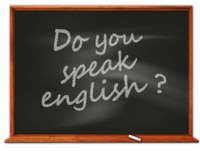
Gregg Roberts, a language expert from the USA, said, “Monolingualism is the illiteracy of the 21st century.” My first thought is that this is quite a strong statement because, by their definitions, monolingualism and illiteracy are by no means equal. However, Roberts has a point. In a world where people from all over the planet are communicating with each other all the time, being multilingual has many advantages.
About a year and a half ago, I was in a supermarket in China, buying notebooks. There was a problem with one of them and the cashier informed me in broken English that I could not buy it. After a tiring day, this was the last thing I wanted to hear. It took a few minutes of exasperation (which quickly turned into anger on my part) to find out what the problem was and to fix it. I walked out of the shop feeling awful about being so harsh with the cashier, who had stayed calm throughout the whole thing, and wishing there was no such thing as a language barrier.
Not being able to understand what someone is saying is one of the most frustrating things I have ever experienced. Understanding what someone is saying, but not being able to form a meaningful response is perhaps even more frustrating. Effective communication, be it with a cashier in a supermarket, a potential business partner or even someone who can give you directions to the post office, is essential for survival in the world. Speaking more than one language immediately allows you to communicate effectively with more people.
Multilingualism breaks down language barriers but also breaks down expressive limitations. People who speak more than one language will know that in each language, there are terms that cannot be translated into any other language. “Snacks for the road” simply does not hold the same meaning as the word “padkos”, which is an Afrikaans word that translates to “road food”. And when there is a single piece of the padkos left because nobody wants to take it for fear of seeming rude, it is called the “anstand stückchen” (directly translated from German as “decorum morsel”). These terms bring new concepts to life, concepts that require long explanations in any other language.
With each language comes not only a variety of unique, untranslatable sayings but also a set of cultural norms and a unique worldview. Learning a new language immediately broadens your own view of the world and is the best way to combat narrow-mindedness when it comes to other cultures. It may be easier to stop seeing a person eating with chopsticks as “different” or “other” when you can say “kuàizi” (Chinese for “chopsticks”).
Therefore, while monolingualism is not absolutely synonymous with illiteracy, not being able to speak the language of the person with whom you are communicating has similar consequences to illiteracy. Multilingualism opens doors for communication and expression that are priceless in today's world, especially in the diverse country in which we live.